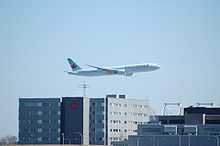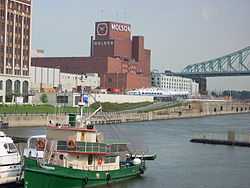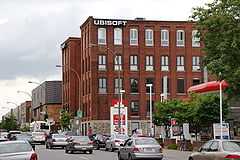Economy of Montreal

The Economy of Montreal is the second largest of all cities in Canada[1] and the first in Quebec.[2] The city is today a centre of commerce, industry, technology, culture, finance, and world affairs.
History

Montreal and Toronto
Between the end of World War II and 1971, both Montreal and Toronto grew enormously in size. Between 1941 and 1951, Montreal's population grew by 20% and Toronto's by 25%.[3] Over the next decade, it was 35% for Montreal and 45% for Toronto.[4] From 1961 to 1971, it was a little below 20% for Montreal and 30% for Toronto.[5] In the early 1970s, Toronto, the metropolis of Ontario, had surpassed Montreal in population size. This was 30 years after Toronto had begun challenging Montreal as the economic capital of Canada. Indeed, the volume of stocks traded at the Toronto Stock Exchange surpassed that traded at the Montreal Stock Exchange in the 1940s.[6]
Recovery
During the 1980s and early 1990s, Montreal experienced a slower rate of economic growth than many other major Canadian cities. By the late 1990s, however, Montreal's economic climate had improved, as new firms and institutions began to fill the traditional business and financial niches.[7] As the city celebrated its 350th anniversary in 1992, construction began on its two newest and largest skyscrapers : 1000 de La Gauchetière and 1250 René-Lévesque. Montreal's improving economic conditions allowed further enhancements of the city infrastructure, with the expansion of the metro system, construction of new skyscrapers and the development of new highways including the start of a ring road around the island. The city also attracted several international organizations to move their secretariats into Montreal's Quartier International
Industries

Montreal industries include aerospace, electronic goods, pharmaceuticals, printed goods, software engineering, telecommunications, textile and apparel manufacturing, tobacco and transportation. The service sector is also strong and includes civil, mechanical and process engineering, finance, higher education, and research and development. In 2002, Montreal ranked as the 4th largest centre in North America in terms of aerospace jobs.[8] Greater Montreal had a GDP of $120 billion in 2005, placing it 39th in the world.[9] It is expected to grow to almost $126 billion in 2008 and $140 billion by 2012.[10]
Port of Montreal
The Port of Montreal is the largest inland port in the world, handling 26 million tonnes of cargo annually.[11] As one of the most important ports in Canada, it remains a trans-shipment point for grain, sugar, petroleum products, machinery, and consumer goods. For this reason, Montreal is the railway hub of Canada and has always been an extremely important rail city; it is home to the headquarters of the Canadian National Railway,[12] and was home to the headquarters of the Canadian Pacific Railway until 1995.[13]
Video Game Industry
The video game industry is also booming in Montreal since 1997, coinciding with the opening of Ubisoft Montreal.[citation needed] Recently, the city has attracted world leading game developers and publishers studios such as Ubisoft, EA, Eidos Interactive, Artificial Mind and Movement, Bioware, and Strategy First, mainly because video games jobs have been heavily subsidized by the provincial government. Every year, this industry generates billions of dollars and thousands of jobs in the Montreal area.[citation needed]
Arts
Montreal is also a centre of film and television production. Five studios of the Academy Award-winning documentary producer National Film Board of Canada can be found here, as well as the head offices of Telefilm Canada, the national feature-length film and television funding agency. Given its eclectic architecture and broad availability of film services and crew members, Montreal is a popular filming location for feature-length films, and sometimes stands in for European locations.[citation needed] The city is also home to many recognized cultural, film and music festivals (Just For Laughs, Montreal Jazz Festival, and others), which contribute significantly to its economy. It is also home to one of the world's largest cultural enterprises, the Cirque du Soleil.[citation needed]
In 2006 Montreal was named a UNESCO City of Design, only one of three design capitals of the world (with the others being Berlin and Buenos Aires).[14] This distinguished title recognizes Montreal's design community. Since 2005 the city has also been home for the International Council of Graphic Design Associations (Icograda);[15] the International Design Alliance (IDA).[16]
Organizational and Corporate Headquarters
The headquarters of the Canadian Space Agency are located in Longueuil, southeast of Montreal.[17] Montreal also hosts the headquarters of the International Civil Aviation Organization (ICAO, a United Nations body);[18] the World Anti-Doping Agency (an Olympic body);[19] the International Air Transport Association (IATA);[20] and the International Gay and Lesbian Chamber of Commerce (IGLCC),[21] as well as some 60 other international organizations in various fields (See below).


- Air Canada - Airline (Canada's largest)[22]
- Air Transat - Airline[23]
- Alimentation Couche-Tard - Convenience store operator (Largest in Canada)[citation needed]
- Bell Canada (Telecommunications and Media) - Global HQ[24]
- BeyondTheRack - E-Commerce, Flash Sales
- Bombardier Inc. (Aircraft manufacturing, mass transportation equipment manufacturing and financial services provider) - Global HQ[citation needed]
- CAE,[citation needed]
- Canadian National Railway[citation needed]
- CGI Group (Information technology) - Global HQ[25]
- Cirque du Soleil[citation needed]
- Desjardins Group,[citation needed]
- Hydro-Québec[citation needed]
- Laurentian Bank
- MEGA Brands[citation needed]
- Molson[26]
- National Bank of Canada[citation needed]
- Power Corporation,[citation needed]
- Pratt and Whitney Canada[27]
- Quebecor[citation needed]
- Rio Tinto Alcan[citation needed]
- Saputo[citation needed]
- SNC-Lavalin,[28]
- Tembec[citation needed]
- Transat A.T.[29]
- Via Rail[30]
Prior to its dissolution, the airline Jetsgo was headquartered in Montreal.[31]
See also
References
- ↑ Metropolitan Toronto 1st with $209 Billion US in 2005, Metropolitan Montreal 2nd with $120 Billion US also in 2005.
- ↑ In 2007, Metropolitan Montreal was responsible for $123 Billion US of Quebec's $249 Billion USD GDP
- ↑ Census of Canada, 1941, Census of Canada, 1951
- ↑ Census of Canada, 1961
- ↑ Census of Canada, 1971
- ↑ Jacobs, Jane (1980). The Question of Separatism: Quebec and the Struggle Over Sovereignty, Chapter II (Montreal and Toronto)
- ↑ Brooke, James (2000-05-06). "Montreal Journal; No Longer Fading, City Booms Back Into Its Own". New York Times. Retrieved 2008-04-12.
- ↑ AEROSPACE: Metro Montreal 2003, Strategic Profile (PDF). Montreal, Quebec: thomas finney. 1760. Archived from the original on 2006-11-18. Retrieved 2007-01-03.
- ↑ PricewaterhouseCoopers (March 11, 2007). "The 150 richest cities in the world by GDP in 2005". RICHEST CITIES BY GDP. PricewaterhouseCoopers. Retrieved 2008-08-01.
- ↑ Conference Board of Canada. "Real GDP growth (Montreal metropolitan area)" (XLS). MontrealInternational. Retrieved 2008-08-01.
- ↑ "The Port of Montreal unveils its project, which will generate $3.4 billion in annual economic spinoffs for Montreal" (PDF). Press Release. Port of Montreal. April 17, 2008. Retrieved 2008-08-01.
- ↑ "Contact Us - CN Mailing Addresses". Canadian National Railway. Archived from the original on 2008-04-13. Retrieved 2008-08-01.
- ↑ Nemeth, Mary; Liz Warwick (December 4, 1995). "CP Rail Leaves Montreal". The Canadian Encyclopedia. Retrieved 2008-08-01.
- ↑ "Montreal, Canada appointed a UNESCO City of Design". UNESCO. 2006-06-07.
- ↑ "CONTACT". About. Icograda. Retrieved 2008-08-01.
- ↑ "The International Design Alliance Settles in Montreal.". Business Services Industry (Canadian Corporate News). May 30, 2005. Retrieved 2008-08-01.
- ↑ "CSA Headquarters". Contact Us. Canadian Space Agency. Retrieved 2008-08-01.
- ↑ "ICAO Premises". International Civil Aviation Organization. Retrieved 2008-08-01.
- ↑ "Regional Offices". World Anti-Doping Agency. Retrieved 2008-08-01.
- ↑ "Our Offices". About Us. International Air Transport Association. Retrieved 2008-08-01.
- ↑ "Contact Us". International Gay and Lesbian Chamber of Commerce. Archived from the original on 2008-05-03. Retrieved 2008-08-01.
- ↑ "Investors Contacts." Air Canada. Retrieved on May 18, 2009.
- ↑ "Contact Us." Air Transat. Retrieved on May 20, 2009.
- ↑ "Contact Us." Bell Canada. Retrieved on August 24, 2009.
- ↑ "Our Offices." Air Transat. Retrieved on February 09, 2011.
- ↑ "Our Locations." Molson. Retrieved on February 08, 2011.
- ↑ "." Pratt and Whitney Canada. Retrieved on February 09, 2011.
- ↑ "Contact Us." SNC-Lavalin. Retrieved on February 08, 2011.
- ↑ "Contact Us." Transat A.T. Retrieved on May 20, 2009.
- ↑ "Access to Information." Via Rail. Retrieved on June 9, 2009.
- ↑ "Talk to Us." Jetsgo. Retrieved on June 5, 2009.
| |||||||||||||||||||||||||||||||||||

